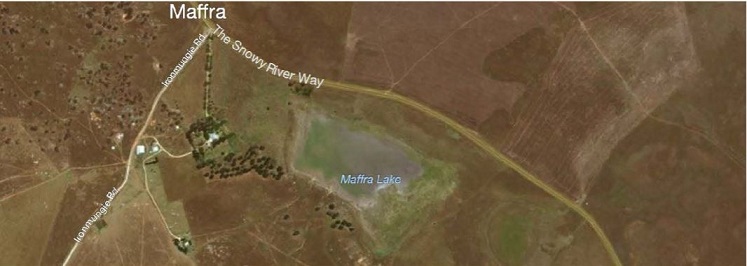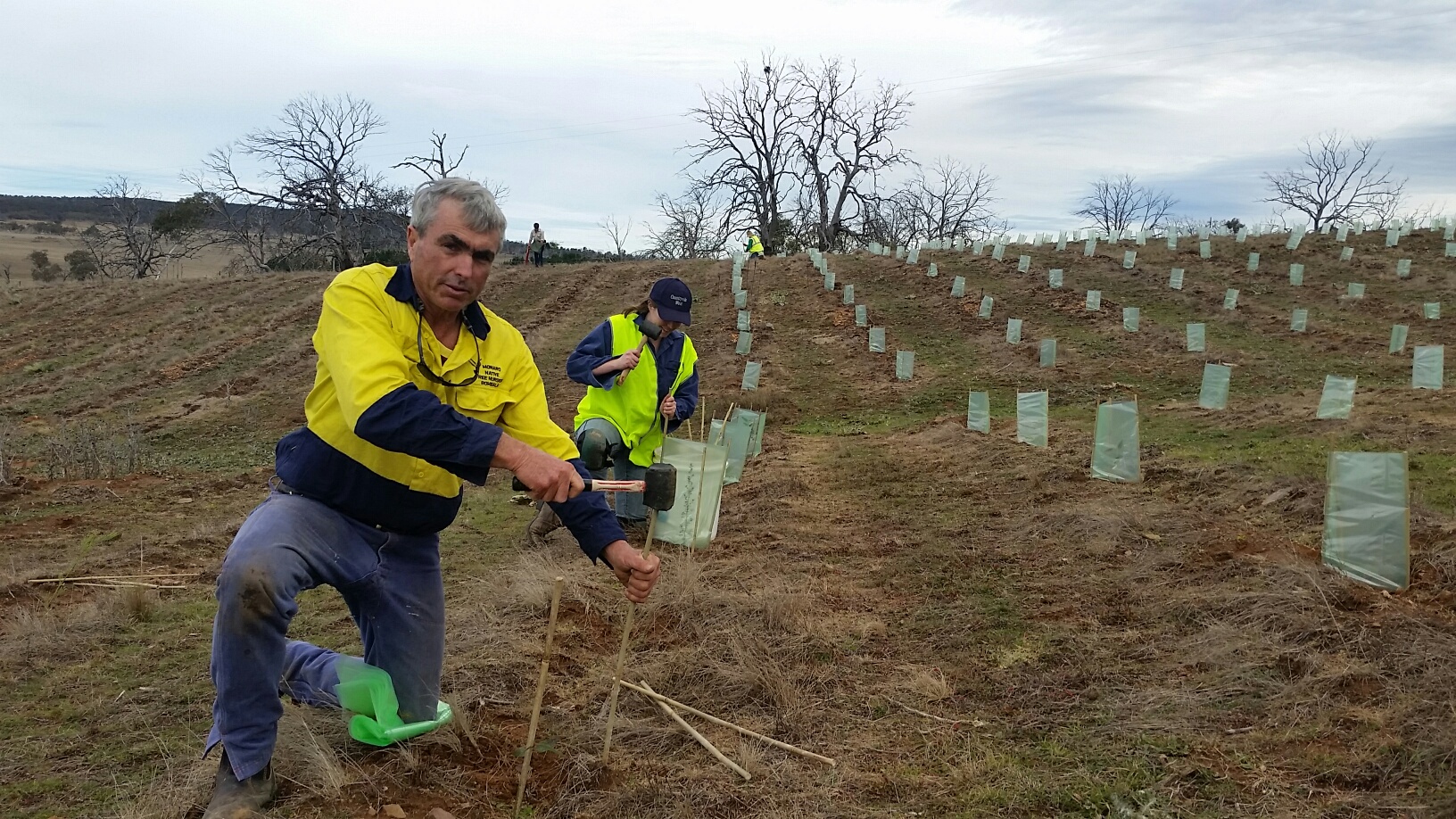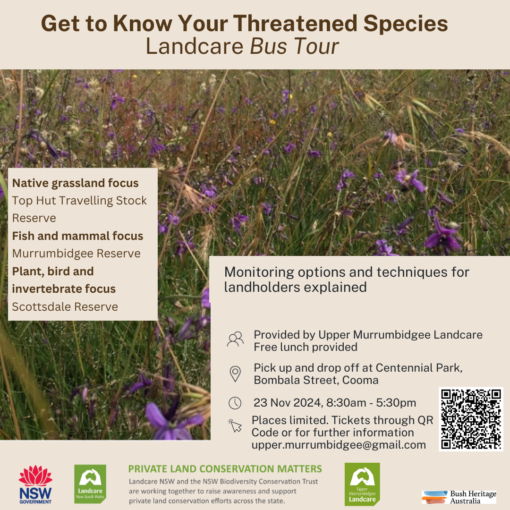At the recent AGM of Berridale Rocky Plain Landcare the committee decided to raise concerns regarding TSR maintenance with the Minister for Primary Industries, Niall Blair, MLC.
(Full copy here… TSR Letter to Minister)
“Dear Minister,
Re: Maintenance of Travelling Stock Reserves
The Berridale Rocky Plain Landcare Group is a small group made up of landholders on the Monaro region of southern NSW. Our role is to encourage and support sound land management within our area including, as a high priority, the control of noxious weeds.
At our recent Annual General Meeting (AGM) members expressed their frustration and dissatisfaction with the land management of Travelling Stock Reserves (TSRs) in our area. In particular these points related to what was described as the complete failure of Local Land Services to carry out any control measures, on the local TSRs, against African Lovegrass which is a locally prescribed noxious weed.
African Lovegrass has developed into a pervasive weed requiring all landholders to take urgent control action. Most TSRs are heavily infested. It is therefore alarming to find that the body responsible for promoting control measures, completely ignoring their responsibility on land under their direct ownership and setting such a poor example. This is particularly galling to landholders who face council orders when control measures are not taken but government bodies are not subject to the same controls.
Discussions touched on other aspects of the management of the TSRs with fence maintenance also seen as a problem. The AGM carried the motion: ” That a letter be sent to the Minister with a copy to the local state member expressing dissatisfaction at the complete failure of the local Local Land Services to control noxious weeds on Travelling Stock Reserves.””
Re: Maintenance of Travelling Stock Reserves
The Berridale Rocky Plain Landcare Group is a small group made up of landholders on the Monaro region of southern NSW. Our role is to encourage and support sound land management within our area including, as a high priority, the control of noxious weeds.
At our recent Annual General Meeting (AGM) members expressed their frustration and dissatisfaction with the land management of Travelling Stock Reserves (TSRs) in our area. In particular these points related to what was described as the complete failure of Local Land Services to carry out any control measures, on the local TSRs, against African Lovegrass which is a locally prescribed noxious weed.
African Lovegrass has developed into a pervasive weed requiring all landholders to take urgent control action. Most TSRs are heavily infested. It is therefore alarming to find that the body responsible for promoting control measures, completely ignoring their responsibility on land under their direct ownership and setting such a poor example. This is particularly galling to landholders who face council orders when control measures are not taken but government bodies are not subject to the same controls.
Discussions touched on other aspects of the management of the TSRs with fence maintenance also seen as a problem. The AGM carried the motion: ” That a letter be sent to the Minister with a copy to the local state member expressing dissatisfaction at the complete failure of the local Local Land Services to control noxious weeds on Travelling Stock Reserves.””
The Minister’s Reply
(Full copy here… MinisterReplyReTSRMaintenance)
“Dear Mr Bentley,
Thank you for your letter of 1 May 2016 regarding the maintenance of Travelling Stock Reserves (TSRs) and the control of African lovegrass.
Thank you for your letter of 1 May 2016 regarding the maintenance of Travelling Stock Reserves (TSRs) and the control of African lovegrass.
Local Land Services acknowledges that the control of African lovegrass and other noxious weeds is a difficult task. Weed management requires an integrated approach to be effective. South East Local Land Services is acutely aware of the spread of noxious weeds, particularly where livestock and other animals graze TSRs, and along roadsides due to contaminated vehicles and machinery.
South East Local Land Services is committed to the control of noxious weeds, including African lovegrass, on parcels of Crown land it manages. Currently, South East Local Land Services manages in excess of 500 parcels of Crown land across the south east region of NSW, covering over 7800 hectares.
One initiative implemented by Local Land Services to assist in this management is to consider adjoining landholders when assessing TSR leases throughout the region. lf a TSR is suitable for a long-term grazing permit, there are numerous conditions in the permit that place the responsibility of weed management with the lessee. This is the case for weed and pest animal management control, as well as for fence maintenance.
South East Local Land Services acknowledges that enforcement of grazing permit terms and conditions, and the conduct of pre and post lease inspections, are areas requiring improvement.
South East Local Land Services biosecurity staff has undertaken weed control on many TSRs, as resources have allowed. lt has a biosecurity officer dedicated to the day{o-day management of 105 TSRs in the Cooma area. Weed management on these TSRs is undertaken on the basis of priority and potential weed impacts on adjoining land holdings.
In 2015, the South East Local Land Services Snowy River Biodiversity – Weaving the Web project, provided funding for contracts to controlAfrican lovegrass. Additional works were undertaken on the TSRs of Dog Kennel, Dutton, Mason, Maffra, Dalgety, Beloco and Numbla Vale. These TSRs are located in the Snowy River Landcare area.
Local Land Services is currently undertaking the development of a state-wide framework for the future management of this land. The draft state-wide framework will allow for the development of a regional TSR management plan for South East NSW to facilitate more consistent and transparent management, resourcing and reporting.
ln addition, South East Local Land Services recently commenced a review of the condition of TSRs throughout the region. This review considers a range of issues such as weeds, fencing, water availability and groundcover. This information will inform thedevelopmentof the regionalmanagement plarl which will address specific local issues, such as weed control.
I trust this information is of assistance.”
South East Local Land Services is committed to the control of noxious weeds, including African lovegrass, on parcels of Crown land it manages. Currently, South East Local Land Services manages in excess of 500 parcels of Crown land across the south east region of NSW, covering over 7800 hectares.
One initiative implemented by Local Land Services to assist in this management is to consider adjoining landholders when assessing TSR leases throughout the region. lf a TSR is suitable for a long-term grazing permit, there are numerous conditions in the permit that place the responsibility of weed management with the lessee. This is the case for weed and pest animal management control, as well as for fence maintenance.
South East Local Land Services acknowledges that enforcement of grazing permit terms and conditions, and the conduct of pre and post lease inspections, are areas requiring improvement.
South East Local Land Services biosecurity staff has undertaken weed control on many TSRs, as resources have allowed. lt has a biosecurity officer dedicated to the day{o-day management of 105 TSRs in the Cooma area. Weed management on these TSRs is undertaken on the basis of priority and potential weed impacts on adjoining land holdings.
In 2015, the South East Local Land Services Snowy River Biodiversity – Weaving the Web project, provided funding for contracts to controlAfrican lovegrass. Additional works were undertaken on the TSRs of Dog Kennel, Dutton, Mason, Maffra, Dalgety, Beloco and Numbla Vale. These TSRs are located in the Snowy River Landcare area.
Local Land Services is currently undertaking the development of a state-wide framework for the future management of this land. The draft state-wide framework will allow for the development of a regional TSR management plan for South East NSW to facilitate more consistent and transparent management, resourcing and reporting.
ln addition, South East Local Land Services recently commenced a review of the condition of TSRs throughout the region. This review considers a range of issues such as weeds, fencing, water availability and groundcover. This information will inform thedevelopmentof the regionalmanagement plarl which will address specific local issues, such as weed control.
I trust this information is of assistance.”




